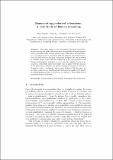Files in this item
Enumerating preferred extensions : a case study of human reasoning
Item metadata
| dc.contributor.author | Toniolo, Alice | |
| dc.contributor.author | Norman, Timothy J. | |
| dc.contributor.author | Oren, Nir | |
| dc.contributor.editor | Black, Elizabeth | |
| dc.contributor.editor | Modgil, Sanjay | |
| dc.contributor.editor | Oren, Nir | |
| dc.date.accessioned | 2018-10-31T10:30:11Z | |
| dc.date.available | 2018-10-31T10:30:11Z | |
| dc.date.issued | 2018 | |
| dc.identifier | 256048889 | |
| dc.identifier | cab004e5-78f1-43ef-9cff-ecdac9f0547f | |
| dc.identifier | 85043992104 | |
| dc.identifier | 000449911600014 | |
| dc.identifier.citation | Toniolo , A , Norman , T J & Oren , N 2018 , Enumerating preferred extensions : a case study of human reasoning . in E Black , S Modgil & N Oren (eds) , Theory and Applications of Formal Argumentation : 4th International Workshop, TAFA 2017, Melbourne, VIC, Australia, August 19-20, 2017, Revised Selected Papers . Lecture Notes in Computer Science (including subseries Lecture Notes in Artificial Intelligence and Lecture Notes in Bioinformatics) , vol. 10757 LNAI , Springer , Cham , pp. 192-210 , 4th International Workshop on Theory and Applications of Formal Argumentation, TAFA 2017 , Melbourne , Australia , 19/08/17 . https://doi.org/10.1007/978-3-319-75553-3_14 | en |
| dc.identifier.citation | workshop | en |
| dc.identifier.isbn | 9783319755526 | |
| dc.identifier.isbn | 9783319755533 | |
| dc.identifier.issn | 0302-9743 | |
| dc.identifier.other | ORCID: /0000-0002-6816-6360/work/48774931 | |
| dc.identifier.uri | https://hdl.handle.net/10023/16360 | |
| dc.description.abstract | This paper seeks to better understand the links between human reasoning and preferred extensions as found within formal argumentation, especially in the context of uncertainty. The degree of believability of a conclusion may be associated with the number of preferred extensions in which the conclusion is credulously accepted. We are interested in whether people agree with this evaluation. A set of experiments with human participants is presented to investigate the validity of such an association. Our results show that people tend to agree with the outcome of a version of Thimm’s probabilistic semantics in purely qualitative domains as well as in domains in which conclusions express event likelihood. Furthermore, we are able to characterise this behaviour: the heuristics employed by people in understanding preferred extensions are similar to those employed in understanding probabilities. | |
| dc.format.extent | 19 | |
| dc.format.extent | 393557 | |
| dc.language.iso | eng | |
| dc.publisher | Springer | |
| dc.relation.ispartof | Theory and Applications of Formal Argumentation | en |
| dc.relation.ispartofseries | Lecture Notes in Computer Science (including subseries Lecture Notes in Artificial Intelligence and Lecture Notes in Bioinformatics) | en |
| dc.subject | Argumentation | en |
| dc.subject | Probabilistic semantics | en |
| dc.subject | User evaluation | en |
| dc.subject | QA75 Electronic computers. Computer science | en |
| dc.subject | Computer Science(all) | en |
| dc.subject | Theoretical Computer Science | en |
| dc.subject | T-NDAS | en |
| dc.subject.lcc | QA75 | en |
| dc.title | Enumerating preferred extensions : a case study of human reasoning | en |
| dc.type | Conference item | en |
| dc.contributor.institution | University of St Andrews. School of Computer Science | en |
| dc.identifier.doi | 10.1007/978-3-319-75553-3_14 |
This item appears in the following Collection(s)
Items in the St Andrews Research Repository are protected by copyright, with all rights reserved, unless otherwise indicated.

